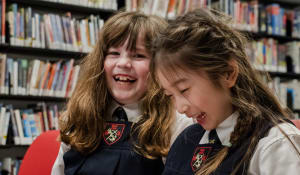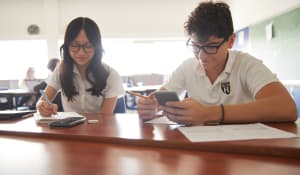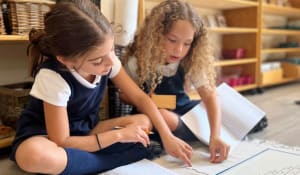
Italian education and language immersion
Recognizing this gap, Tassielli and Ritacca modelled the school after other independent private schools in the city but emphasized Italian as the cornerstone of their curriculum. “Every student takes Italian every day,” Tassielli says. “Our mission is to ensure our students gain a deep connection to their heritage, with a multi-cultural framework, while excelling academically.”
Learning multiple languages at a young age has been linked with enhanced cognitive development, improved memory, problem-solving skills, and creativity. It has also been shown to enhance cultural awareness and empathy while leading to stronger connections to the community. “Early language education lays the foundation for academic success and can often open doors to diverse career opportunities,” Tassielli explains.
The founders saw an opportunity to provide a full Italian immersion preschool for LDVA’s youngest students. Children between the ages of two and a half and six can enrol in the "Scuola Materna" preschool, a program that is Montessori-based, includes French and music, and is recognized by the Italian government.
Early childhood is the brain’s most flexible period for acquiring new skills and development. During this time, children are more adept at mimicking pronunciation, often leading to fluency without much effort. “We believe there’s a great advantage to having this immersion opportunity available to young learners,” says Tassielli. The founders of LDVA realize that preschool to Grade 8 provides the foundational years for language learning and healthy personal growth.
Leonardo Da Vinci Academy of Arts & Sciences offers Italian language classes to students from Grades 1 to 8, where they develop speaking, reading, and writing skills. Many students begin in preschool, but even those joining the school later are quickly immersed in Italian. Alongside Italian, the school emphasizes French instruction starting at age three, giving students the advantage of learning two additional languages fluently by the time they graduate.

“We see a lot of academic benefits from learning multiple languages,” says Tassielli. “Students get more French with us than they would in public school, and with small classes and dedicated teachers we find they can really absorb the languages they learn.” He says their students are also often more successful in subjects like math, music, and English as a result.
The integration of Italian culture extends beyond language. Many LDVA students have parents who speak English at home, but their grandparents speak Italian. Tassielli explains: “A lot of our families came from Italy, and so the children are learning the language and culture of their grandparents.” Events such as Carnival, Christmas concerts, and Grandparents’ Day celebrate Italian traditions, fostering a sense of pride and connection in students and their families. “These events often bring grandparents to tears as they watch their grandchildren perform classic Italian songs and plays, bridging generations through shared heritage.”
A unique learning environment
In recent years, LDVA has found a permanent home at the Columbus Centre, a renowned Italian cultural hub in Toronto. This space includes state-of-the-art classrooms, a gym, a pool, and access to cultural and athletic programs. This further enriches the student experience.
The school’s small size facilitates individualized attention and a close-knit community where every child participates and contributes. Music and the arts are integral to the curriculum, with students learning instruments, performing in concerts, and exploring drama. “We nurture and empower both sides of the brain,” co-founder Sal Ritacca explains. “Science and math are vital, but so are music, art, and drama.”
In addition to the Italian immersion preschool, LDVA also operates an English-speaking Montessori program. Accredited by the Canadian Council of Montessori Administrators (CCMA), this program provides another pathway for families seeking a nurturing educational environment that includes Italian, French, and music classes.

Along with its aim of promoting Italian language and culture, another aspect of LDVA that makes it a unique and exceptional institution is its “Thinking Like Leonardo” approach to lifelong learning. As Ritacca describes, “The book by Michael Gelb inspired us to adapt its Seven Da Vincian Principles to develop the academy’s approach and guiding principles for teaching and learning.” Details are found on the school’s website.
Upon the founding of LDVA in 1983, one of the most encouraging comments sent to the founders was from the then Minister of State for Multiculturalism: “I feel this school will be an innovative addition to the country’s educational resources and will fulfill a worthwhile function. You and your colleagues are to be congratulated for your efforts.”
“We’ve nurtured our passion for LDVA for more than 40 years and I wouldn’t change it for the world,” says Tassielli. “We are so proud of our grads who come back to share their success stories with us, and we’re excited for the future of our school as it continues to grow and evolve.”
























